Chris Nickson's Blog, page 2
May 14, 2025
5 Reasons Why You Need To Buy No Precious Truth Now
Bonus: I want to sell plenty of copies of this, partly because it’s very good, but also because it means my publisher will let me continue the series. The second comes out next year, but I want a third and a fourth, so…please?
Buy it from an independent bookshop if you can, but the behemoth is going to be easier for some people. The link is here. I know money’s tight for so many people – ask your local library to get it for you.
Thank you.

April 30, 2025
My DNA Is Leeds…
Hard to believe that it’s almost two weeks since the wonderful launch for No Precious Truth. Time’s felt compressed since then. But April has seemed to rush by, as if it was sprinting, so strange after a never-ending March.
A week later and the Yorkshire Post published an interview with me, one that captured me and my writing pretty well, I think.


I’d barely caught my breath when I had to write a paper I’d agreed to present at a symposium for music in the Leeds collections, in the new music library (and you really should see it) that’s part of the central library. I’d been asked to talk about Frank Kidson and his materials. A shock to me, as I’m no academic – not even a degree – but I’m a great admirer of Kidson and what he did.
He and his niece and companion, Ethel, are minor characters in the Tom Harper book, The Tin God, where his knowledge of folk song is important in unravelling the clues. He was one of the pioneering Victorian folk song collectors, penning a column about songs in the Leeds Mercury Supplement for a few years and published books on folk music; the most famous is the influential Traditional Tunes, which was largely preciously unknown music, much from Yorkshire, especially Leeds.

Leeds Libraries has an excellent collection, a handwritten biography of him by his niece, his watercolour sketchbook, arrangement of songs he worked on with composer Arthur Grimshaw (son of the famous Leeds painter Atkinson Grimshaw), and much more.
It was an honour to be asked to do this and have the rare luxury of spending time with the materials. I’ve wrote about Kidson for fRoots magazine in 2018 and I was grateful for the chance to spend time with him once more.
The day after was my school reunion. 53 years, although we bulked up the numbers by including the two years below. It was interesting. I’d expected it to be that, so I wasn’t disappointed. I’d seen a couple of the people more recently, and it was good to catch up with them. But I was never part of the mainstream at school, and there were plenty I didn’t recall.
Tomorrow, another symposium, this time at the law school of the University of Sheffield. Talking about crime fiction, so I’ve prepared that paper, even as I’ve been going through the proofs for A Rage Of Souls, the next Simon Westow novel, coming in October.

After that, I’ll be ready to take the long weekend off…
Of course, No Precious Truth hasn’t even been out for a month yet. If you haven’t read it yet, I’d certainly appreciate the sales. Independent bookshops are always best, but wherever you want. And for those on a budget, please, ask your public library to order it in, if they haven’t already. A little about Cathy from the Yorkshire Post interview, just to convince you.


April 22, 2025
The Book Launch Last Week…
I’m sorry you couldn’t be there, out at Kirkstall Forge for the launch of No Precious Truth. I never counted how many came, but the estimates are between 50 and 60 – a hell of a turnout for a sunny Thursday evening, and I’m flattered so many attended.

A number of faces I knew, and far many more that I didn’t. There had been an article about the event in the regional newspapers that must have made people curious. But also people familiar with my books, curious to see Leeds in a World War 2 setting, and to meet Woman Police Sergeant Cathy Marsden. And to be terrified by that rare vision of me in a suit.

The Forge features in the book, making it an ideal location for the launch. It had been important in the war (and was bombed in 1942, with five men losing their lives). I’m grateful to Lucinda Yeadon, who ended up in hospital two nights before the event (all wishes for a speedy recovery), to Marius and Shelly for being so receptive to the idea and organising everything, as well as providing refreshments for everyone.

Plenty of artifacts and ledgers from the Forge in wartime were on display, along with replica war documents, like ration books and identity cards, and newspapers.

Truman Books, a wonderful independent from Farsley, was the bookseller. 22 copies of No Precious Truth were sold, as well as two from the Tom Harper series. Thank you, everyone who bought a copy.

The centrepiece, though, was the cake, made and decorated by Lizzie, the daughter of Shelly, who runs Butler’s café, the venue for the event. Isn’t it glorious? Here it is, before and after.


I’m grateful to everyone who came and all those involved in putting on the event. Thank you. I hope the photos make you feel you were there. Remember, you can buy the book and see what all those people have discovered. Cheapest UK hardback price, with free postage, is here.
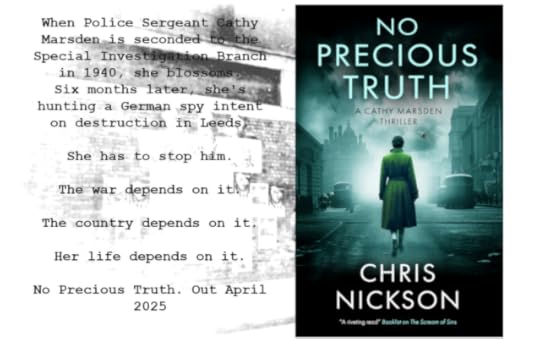
April 2, 2025
Want To Go To A Book Launch?
Yesterday No Precious Truth was released into the wild.
It’s there, waiting for you to adopt it and take it home.
If you really want to meet it (and the author – there’s always a downside) why not come to the book launch in Leeds?
It’s on Thursday, April 17, 6-7pm at Kirkstall Forge, a location that features in the book. Plenty of parking, or it has its own little railway station, five minutes on the train from Leeds City station. If you’re anywhere close to Leeds, I promise it’ll be worth your while.
I’d love to have as many people there as possible. It’s free, there’s cake, and Truman Books will be on hand to sell copies of the book. Artefacts from the Forge on display, photos from the war, replica war documents and newspapers for you to examine.
And cake. Did I say cake?
Please, come along. If you can email Lucinda at lucinda.yeadon@ceg.co.uk so she can keep an eye on the numbers, that would be great.
I hope to see plenty of faces. Thank you.

March 25, 2025
Publication And An Unsung Hero
Just a week until No Precious Truth is published (April 1, and I hope that’s not an omen!). It’s seemed so distant for so long, and now it’s barrelling down on me at a rate of knots.
Things are in place. I have a new review from Booklist that says the book has a “likable heroine, a twist-a-minute plot, and heart-wrenching details about the effects of war make this a good choice for fans of historical wartime mysteries.”
I’ll definitely take that. Meanwhile out of the blue, the Promoting Crime Fiction website has declared an as “Unsung Hero Of Crime Fiction.” I’m flattered, but I don’t feel very heroic. Read it here.
The blog tour begins on publication days. Eight stops, eight different reviews, all posted online (mostly Instagram, I believe). Keep your eyes peeled for them.

I’ve taken out ads, putting my money where my mouth is because I believe in this book.

There’s going to be a launch. It’s on Thursday, April 17th, from 6-7 pm. It’s going to be held at Kirkstall Forge, which features in the book. They’ll have some photos and artefacts from the war. I’ll be bringing replica documents from the war, as well as newspapers. Truman Books will be there to see you copies of the book.
And there will be a special cake.
You’re invited. If you’re close, come along. Plenty of parking, or the Forge has its own little railways station, just five minutes on the train from Leeds.
If you really can’t wait until then to read No Precious Truth, why not buy it from your local indie bookshop, or Speedy Hen has the cheapest price for the hardback, with free UK postage. Go here and get it.
Thank you all so much.
 File written by Adobe Photoshop? 4.0
File written by Adobe Photoshop? 4.0
March 18, 2025
Life In Wartime Leeds
The following first appeared in History and Heritage Yorkshire – you can find them here. The photos are courtest for the excellent Leodis photo archive. Take a browse.
We’ve all heard about the rationing. Of food, clothes, petrol, coal, pretty much everything, and the way the amounts people were allowed grew smaller and smaller as the war progressed. We had a National Loaf, devised by nutritionists, incredibly healthy, but supposedly tasteless and grey. Ministry of Food pamphlets offered recipes for families during the conflict. People dug for victory in their back gardens. Unused open areas or bomb sites that had been cleared, every kind of spaces was made over into a veg plot.
That was right across the country. But what changes did the war bring to Leeds? In terms of air raids, the city escaped very lightly. We had some – nine in total – and 77 lives were lost. But there was only one of any great consequence, the Leeds Blitz of March 14-15, 1941 (it was termed a quarter-blitz, comparing it in size to the damage inflicted on other cities). The night began with incendiaries, fires lighting the way for the waves of high explosive bombs that arrived later. In all, about 100 houses were destroyed and around 4600 damaged. Bad enough, but not much when compared to elsewhere, and there would only be one more raid of note, in 1942, when five workers at Kirkstall Forge were killed.
The appearance of the city changed. There were sandbags everywhere, tape on the windows of shops and office, as well as home. Much less traffic on the roads due to strict petrol rationing – handcarts and horse-drawn wagons often replaced lorries and vans (out in the country, horses drew ploughs and threshing machines, as if we’d moved back a century).
The Blackout
The blackout meant that those vehicles which kept running, and only a small number were permitted, had to cover head and rear lights, with only a thin slit for illumination – and that made the 20mph speed limit an excellent idea. Curbs, lamp posts, telegraph posts were painted with black and white stripes to aid motorists. Trams had bells that jangled to warn pedestrians who might be in the way. The windows in trams and buses were covered to stop light leaking, then with netting or tape in case of blasts.
The ARP (Air Raid Precaution) wardens were the ones with the job of enforcing the blackout. Stories have so many of them acting like little tin gods, and probably some did. But it was a thankless job.
The blackout should have been a boon to crime. Yet a number of newspapers reported the expected wave of thefts and robberies didn’t happen. There was plenty of opportunistic crime: where houses had been bombed or families fled, there was looting (not much of a problem in Leeds), and some other illegal activities did flourish – while the duties of the police grew. Prostitution became more widespread, and more blatant, for one small example. Some of the women were honest; others would lure their customers into the dark ness and rob them, either alone or with an accomplice.
There was a rise in bag-snatching, thefts from telephone boxes and standing cars, but greater crime figures seemed to be down. In part, that was due to transportation. Petrol rationing made it illegal for most people to use cars. There was plenty of black-market petrol for sale, but cars on the road were remembered, and easily traced. Which might explain why one of the biggest rises was in bicycle theft.
The Black Market
With rationing, there as the inevitable rise of those who saw the chance to make money by bypassing the law. It could be something as simple as a shopkeeper saving a little extra for favoured customers or fudging coupons. It could be the spiv – a term that came into use with the war to denote the stereotype of a flashily-dressed man selling goods on the corner. Rationing and crime were interlinked, and it was responsible for many of the offences that ended up on police blotters and in court.
One of the most widespread of those was that theft of coupons from Ministry of Food offices. The security was non-existent, and if someone broke in at the right time, there were literally thousands of coupons waiting to be taken and sold. Others forged coupons. Essentially, rationing and coupons created an industry.
Items were stolen – entire lorries of them at times, often tinned food. On a smaller scale, things walked out of the stores for the NAAFI canteens which gave food and drink to service personnel. Other items vanished from work. In Bradford, my own grandfather was arrested and convicted of stealing 99 yards of cloth from his employer. He got off with little more than a rap on the knuckles: just a £5 fine.
Outside the small amount allocated for civilian use, petrol was dyed red to deter theft. However, with a little work and ingenuity, the dye could be removed.
Rationed alcohol offered more opportunities. Much of the whisky supply was reserved for export to help the vital balance of payments. Enterprising crooks worked with chemists and made hooch, alcohol created from different things with the kick of booze, then dyed and flavoured and passed off as the real thing, often in recycled bottles and with carefully printed labels. The customers were often clubs – many operating without a licence – where couple and service people on leave went to relax. It had worked during Prohibition in the US and proved successful here. However, there were reports of drinkers becoming ill after using hooch, often severely. Cases of permanent blindness, even death, happened.
Physical Changes
There was bomb damage in Leeds. Far less than other places, but it was there. Marsh Lane goods station was pretty much destroyed, and the same with a number of factories along the river. The front of the museum on Park Row collapsed, and there was damage to the Town Hall, aa well as a number of houses, particularly in Armley.
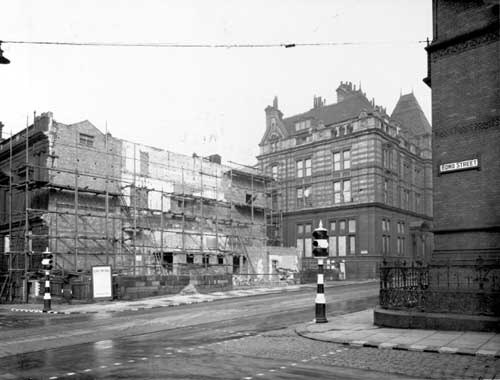
Leeds Museum after the March raid
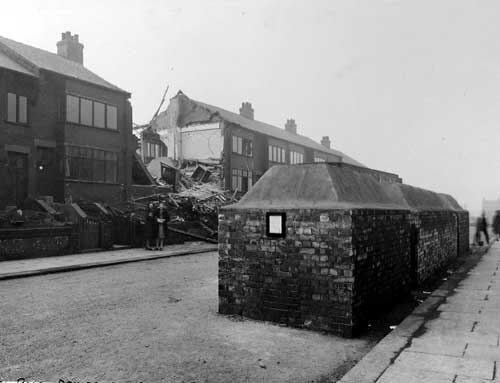
Model Road, Armley
Some of the physical changes were made as precautions. Lewis’s, the big department store on the Headrow had the brick blast wall outside its main entrance to avoid any flying glass and debris. Outside, along the middle of the road, stood a series of emergency water tanks to help deal with any incendiary bombs and fires. They were painted in black and white checks to alert traffic and pedestrians at night.
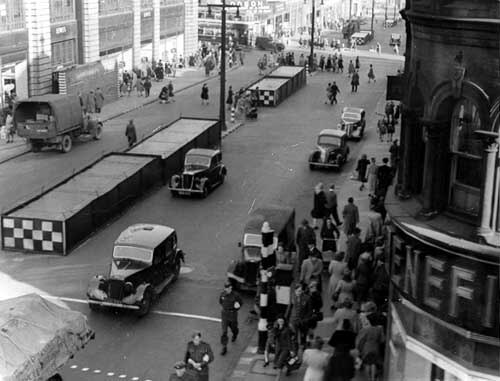
Emergency water ponds were dug all over, although most of them were never needed, thankfully.
The Marks & Spencer store that’s such a familiar sight on Briggate was completed right at the beginning on the war. The company had kept a presence further up the main shopping street since 1909, but this was intended to be the grand flagship store. They purchased and demolished the Rialto cinema at 46 Briggate and built something entirely new and modern. However, in 1940, as they were set to opened, the building was requisitioned by the government for use by the Ministry of Works. A blast wall was erected to cover where the display windows had been (and was soon covered in layers of posters advertising films). The entry for staff was a metal door to the right, still there if you look.
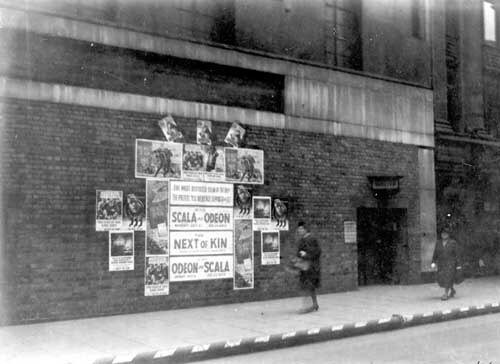
The elegance of Park Square remained, but in a diminished state. The railings around the grass were removed, like most metal, part of a national drive. It was ostensibly to build more Spitfires; the reality was that the metal often just sat in huge, rusting piles in scrapyards.
Food
As mentioned earlier, rationing gradually bit harder and harder. Nutritionists worked on recipes with the Ministry of Food, creating dishes that were both healthy and tasted good (although many might disagree with that). But the reality was that Britons did eat a very healthy diet during the war, better than before it for many, and rationing did create an equality between the classes.
Gardening was encouraged, growing the food that was so desperately needed with imports so limited. There were pamphlets and newspaper columns with characters like Potato Pete. Gardens were made over, empty ground cultivated. A street, even a couple of streets, would use all their scraps and waste to feed a pig that one of them would keep – quite illegally. In return, they’d receive some of the meat when it was butchered.
Fishing was affected, too, with the trawler fleet and the catch depleted, as the Germans considered fishing vessels to be legitimate targets, and mines took their toll. By 1944, the catch was round half the pre-war figure – and that was an improvement over 1941. Fish was never rationed, but the prices rose very steadily as the fighting continued.
These are just a few quick snapshots; there are entire books and studies on each of the topics. The war in Leeds, at least at the beginning of 1941, is the backdrop for my new novel, No Precious Truth. The main character is Woman Police Sergeant Cathy Marsden, one of the very few women in the force back then. She’s’ seconded to the brand-new local squad of the Special Investigation Branch (a real organisation, part of the military police) for three weeks, a period that keeps getting extended. They deal with organised crime and the forces. But suddenly they find themselves facing something very different: an escaped German spy.

It’s published by Severn House, and available as a hardback and ebook from April 1. Buy from an independent if you can, or the cheapest UK hardback price, with free postage, is here. The launch will be at Kirkstall Forge in Leeds (a location in the book) on April 17, 6pm. I hope you’ll show up. All are welcome – they even have their own little train station.
February 11, 2025
The Moment When The Centuries Touch
Sometimes the truly wondrous does happen. When that occurs, it etches a sharp, memorable line in a life.
In my most recent book, Them Without Pain, a true incident from Leeds history is the catalyst for everything that happens. In 1969, goldsmith Arthury Mangey was hanged for coin clipping – which was treason, as it debased the coinage. In his trial it was alleged that he had a secret workshop on Middle Row, the shops and workshops behind the Moot Hall in the middle of Briggate (see the superb cardboard model).

In 1825, the Moot Hall and Middle Row were finally demolished, opening up the town’s main street. But as the workmen tore down walls, they discovered…a hidden workshop, with two pairs of metal shears, a bowl and an Elizabethan coin.
In the book, Simon Westow is there, and in the hidden room he also finds a body. That provides the spark for everything that happens.
Why had no one looked for the room at the time of the trial? Did the things in there really belong to Mangey or had he been set up?
We’ll never know. But some of what was found has remained and will be used in an exhibition on Leeds writing later this year.
Yesterday I was giving a talk at Abbey House Museum, where I’m writer-in-residence. I had the real privilege of holding these shears, of touching history. Maybe Arthur Mangey really did use them to commit treason over 300 years ago and I was able to share that with him. A connection across the centuries.
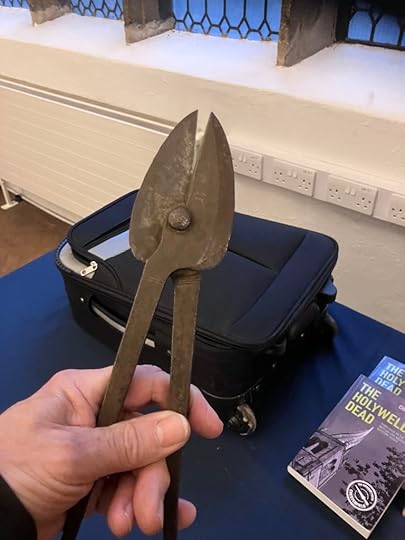
I’d written about them, and they were real. Now that’s magic, isn’t it?
Forgive me for ending on a crass commercial note, but in the UK Amazon has both Kindle and hardback editions at very low prices. See here.
January 21, 2025
Want To Read No Precious Truth Before It’s Published?
My new book, No Precious Truth, will be published on April 1.
However, in exchange for an honest review, you can read it now. It’s available on NetGalley. You need to register with them – free and only takes a few seconds – then be approved for Severn House titles. If you’re not, please drop me a line and I should be able to fix that for you.
It’s the start of a new series, Leeds in World War 2, with a new female lead character I love, but yes, I’m nervous about it, even more so than when a series in established. I’d like plenty of people to read it and give their opinions, so you’d actually be helping me.
Thank you in advance.
If you are registered with NetGalley and approved for Severn Housem simply go here.

January 7, 2025
New Year, New Book, New Series
First of all, a happy 2025. May it bring you healthy and happiness and a sense of calm.
But…new year, new series?
It’s true, I’ve dropped hints and more on here about it. With No Precious Truth (out April 1) I’m shifting to the Second World War and Leeds in 1941.
To begin, I should say I wrote an entire unpublished novel with Cathy that detailed her start with the Special Investigation Branch. And I discovered that she, the era and the situation would not leave me alone. She demanded I write more. The last time that happened was with Annabelle Harper, so draw your own conclusions.
Cathy Marsden was born and raised in Leeds, growing up on Quarry Hill until the family was rehoused to the brand-new Gipton estate in 1934. The city and its people is in her blood – more than she realises at first. Her father receives a pension, lungs ruined by mustard gas at Arras in World War 1. Cathy is a policewoman, a sergeant. She’d been in charge of six female police constables and reporting to a female inspector – at least until September 1940, when she was seconded to the Special Investigation Branch, which had opened a small Leeds office in the summer. The idea was she’d show the five men in the squad around the city. The SIB was made up of former police detectives who’d joined the army or been in the reserve, only to end up in the military police, and then SIB. They have army ranks, are supposed to carry sidearms, and work out of a small office in the Ministry of Works office on Briggate.
Where was that? Does this look familiar?
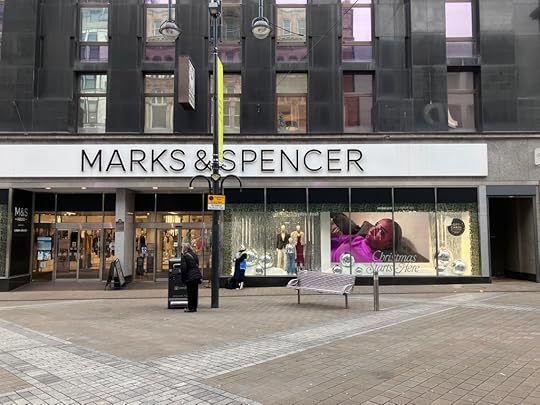
Now take a look at this. It was supposed to be the flagship Marks & Spencer store, but it was requisition by the government for the ministry.
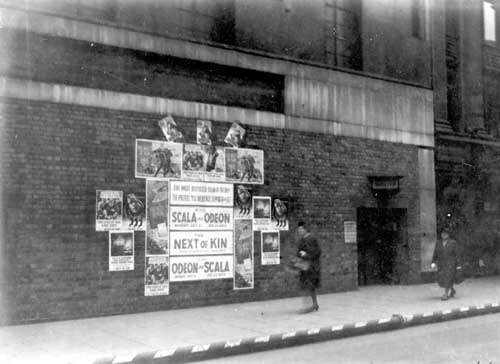
Entrance right here.

The secondment was meant to last three weeks. In that time Cathy proved to be vital to the squad. Working in plain clothes, with her local knowledge, her skills have chance to blossom and the period is extended until she’s there for the duration.
But there’s one other thing she does. Every Friday evening, from 6-10, she’s a firewatcher at the top of Matthias Robinson’s department store, just up Briggate (it became Debenhams, and just reopened as Flannels).
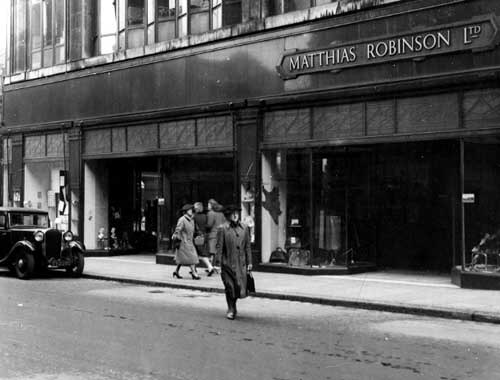
There have been air raids, but Leeds has escaped the horrors inflicted on other British cities – so far. But how long can that last?
Meanwhile, Cathy and the men in SIB are going to have a very big problem. The first inkling is the return of her brother, who moved to London as soon as he could and is, he’s told the family, a civil servant…well, read for yourselves.
From the corner of her eye, Cathy caught sight of someone else entering the room. Her eyes widened in disbelief. He wasn’t anyone she’d ever expected to see in this place. She folded her arms and glared at him.
‘What the hell are you doing here?
Daniel Marsden was five years older than her, the clever boy who won the scholarship to grammar school. The one who passed everything without seeming to do a stroke of work while she studied deep into the night, struggling with her lessons and failing half her exams.
He was the boy people noticed. They remembered him, asked after him, always full of praise, with Cathy a poor second. When Dan landed a Civil Service job and moved down to London, she’d said nothing, but deep inside she’d been glad to see the back of him. After so many years she had the chance to move out of her brother’s shadow. Even now, his Christmas visits each year felt like more than enough time together, watching everyone gather round him. She’d been quietly relieved when he’d said there was too much going on at the ministry last December to be able to come.
Now he was standing in the office where she worked. He smiled.
‘I like the way you’ve had your hair done. It suits you.’
Cathy felt herself bristle. At twenty-six, she’d spent four years as a woman police constable, then two more as a sergeant, before her secondment to SIB and a move into plain clothes. She’d had to fight for respect every step of the way. It had been the same when she started here. She’d needed to work hard to make the squad accept her. To understand that a woman could do this job. Cathy wasn’t going to let her brother dismiss all that with a flippant comment. Just the sight of him here, where she’d built a place for herself, made the excitement and pride at finding Dobson wither away.
‘I’m so very glad you approve.’
Dan shifted his glance away.
‘He’s been sent,’ Faulkner told her. ‘We’re working with him.’
She turned, fire in her eyes. Like the other men in SIB, Adam Faulkner had been a police detective before the war. He’d been in London, a member of the Flying Squad. They were famous, the best Scotland Yard had; everybody in the country had heard of them. He’d joined the army, eager to defend his country, only to find himself shuffled into the military police. Recruited for the Special Investigation Branch when it was formed the year before, last July he’d been posted to Leeds to set up this new squad. A sergeant, like her, but his was an army rank. A good, fair boss.
‘Sent?’ Cathy asked. ‘What do you mean, sent?’
Faulkner closed his eyes for a second. ‘Your brother is with the Security Service,’ he said.
I hope you’re intrigued by a female character front and centre in a Leeds WWII thriller. If you’re registered there with my publisher, No Precious Truth will soon be available to read on NetGalley, in exchange for an honest review. If you’re not registered and fancy it, drop me a line and I’ll arrange it.
Or you could pre-order it, of course. Amazon has the Kindle edition of No Precious Truth pretty cheap in the UK and US. UK version here. In the UK, the cheapest hardback price is here. The cover’s pretty great, too.

And of course, the Kindle version of the latest Simon Westow book, Them Without Pain, is pretty decently priced in the UK. Find it here. The hardback is just over a tenner, too.
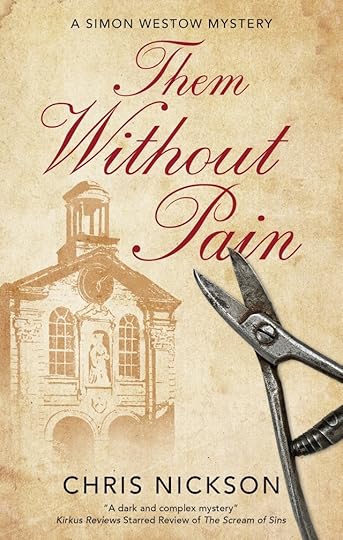
One final thing: Cathy arrives with her own soundtrack. Find the playlist here, but be prepared to dance and jitterbug.
December 24, 2024
Jingling James – An Annabelle Harper Xmas Tale
Actually, not quite Annabelle Harper. Still Annabelle Atkinson, a recent widow after her husband Harry died and left her the Victoria. But you’ll see for yourself.
Here were are, Christmas Eve, and this is the last of the Christmas stories dug out from the past. I hope you’ve enjoyed them. Thank you for reading, and for reading/buying/tolerating my books and posts. Happy holidays – what ever you celebrate – to you and those who hold dear. May 2025 be kind to us all and see us in good health.
Thank you again.
Leeds, December 1887
Annabelle Atkinson didn’t want Christmas to arrive this year. She didn’t feel any of the joy or the goodwill this December. It was barely three months since her husband Harry had died; the earth had barely settled on his grave.
They’d had a few good years before the heart attack took him. Now she had to look after the Victoria public house as well as the two bakeries she’d opened. On her own, sometimes she felt like she was drowning.

On Christmas Eve, once the last customer had gone, she intended to bolt the door, closed the curtains, and keep the world away until Boxing Day. She’d never been one to wallow in sadness; if you had a problem you took care of it and carried on. But these last few weeks…she’d been slowly sinking and she knew it. She felt like one of the jugglers in the halls, trying to keep all the plates spinning in the air. Too many of them.
‘Come on,’ she said to Willie Hailsham, taking the empty pint pot from his hand. ‘You’ve had enough. Get yourself off home so your wife can remember what you look like.’
The same with Harelip Harmon, Donald the Steel Man, and Jingling James, always moving the coins around in his pocket. They’d stay drinking all night if anyone would keep serving them.
‘Don’t you have homes to go to?’
It was the nightly routine, almost a comedy act after so long. They drained their glasses, said their goodnights and then the bar was empty. She locked the door, drew down the bolts and let out a long sigh. Glasses to wash, woodwork and brass to polish.
Better get started, she thought. The work’s not going to do itself.
Up a little after three to supervise the baking in the kitchen at the other end of the yard. The last day before Christmas, orders to fill, plenty of demand; the shops would be little goldmines today. And the Victoria would be packed from the time the factories closed.
Gossiping with the girls as they all worked together, mixing, kneading, baking, the smell of fresh loaves filling the air and making her hungry. Back in the rooms over the pub she made breakfast.
This was what hurt most: the silence. There used to be so much laughter here when Harry was alive. It seemed like there was always something to set them off. Now just being here was oppressive, all the weight of ghosts around her.
Dan the barman and Ellen the barmaid were already working hard with polish when she went downstairs. Sleeves rolled up and plenty of elbow grease, they’d be done soon enough. Nothing for her to do here. The dray from the brewery was due at ten, but Dan could take care of that.
Annabelle put on her cape and picked up her purse. Go into town and have a poke around the shops. An hour or two away might perk her up. But there was no magic in December this year. The pavements were full of people jostling around, weighed down by packages and bags. She felt removed from it all. The displays in the windows of the Grand Pygmalion didn’t make her want to part with her money. She was low, she knew it; a lovely gown or a good hat could usually tempt her. Today, though, there was nothing. No cheer.
Even a stop at the cocoa house for something warm to drink and a slice of cake didn’t help her mood. She trailed back out along North Street, through the Leylands and past the little park, back along to Sheepscar.
Soon enough the Victoria was busy, and it would stay that way until she called time. She took her place behind the bar, smiling, flirting the way she always had, and for a few minutes at least she could forget why she hurt inside.
‘Give over,’ she told one man who insisted he’d be a good husband. ‘I’d wear you out in one night, then I’d have to send you home to your missus.’ It brought laughter. As she walked around, collecting glasses, she brushed hands away, giving the culprits a look. It was all part of running a pub. A game; if you played it well, you were successful. And she had the knack.
Annabelle promised old Jonas free beer for the evening if he played the piano in the corner, and soon half the customers were singing along the favourites from the music hall. It gave her a chance to breathe and Dan could look at the barrels.
By eleven she’d had enough. The pub was still busy, the till was overflowing. But all the noise made her head ache. She needed some peace and quiet for a while. She wanted the place empty.
‘Come on.’ She rang the old school bell she kept under the bar, next to the cudgel for sorting out the unruly. ‘Time for you lot to see your families. They probably don’t believe you exist.’
Slowly, the crowd thinned. Another five minutes and it was down to the usual four still standing and supping. Donald the Steel Man, Willie Hailsham, Jingling James, and Harelip Harmon.
‘That’s enough,’ she told them. Her voice sounded weary. She knew it and she didn’t care. They were regulars, they’d probably been coming in here since they were old enough to peer over the bar. ‘Let’s call it a night, gentlemen, please.’
James slipped off to the privy while she was ushering the others out, wishing them merry Christmas and accepting beery kisses and hugs until they’d gone and she turned the key in the lock.
Then James was there, looking bashfully down at his boots. He was a gentle soul, a widower with grown children. Fifty, perhaps, his hair full white, jammed under his cap.
‘Are you seeing your family tomorrow?’ she asked.
‘Not this year.’ He gave a small shrug. ‘They all have their plans. It’s different now, everyone’s so busy. What about you?’
‘A quiet day. Maybe it’s better that way.’
‘When my Alice died I carried on, same as I always had. The bairns were grown and gone but I still had to work and put a roof over my head.’
‘I know,’ she agreed. The everyday tasks that carried on like a machine. Without thinking, he jingled the coins in his pocket.
‘Then her birthday came around. We never made a fuss when she was alive, well, who could afford to? First we had the little ‘uns, then it didn’t seem to matter so much.’
‘We were the same,’ Annabelle said. ‘No kids, but Harry’s birthday or mine, there was still the pub to run.’
‘Any road, the year she died, on her birthday it suddenly hit me how alone I was. Not just then, but for the rest of my days. Because no one could replace Alice. I had all them years in front of me.’
‘What did you do?’ she asked.
‘I sat there at the table and made myself remember all the good things. How she looked when she smiled, how she sounded when she laughed. The way she were pretty as a picture when we got wed. I said it all like she were sitting there and I was talking to her.’
‘Did it help?’
‘It did. I can tell you’re feeling that way. I can see it in your eyes. I just thought it might help.’ He gave her a smile and bussed her cheek.
‘You said you’re not going anywhere tomorrow?’ Annabelle said.
‘That’s right.’
‘Come round for your tea. It won’t be anything special, mind.’
‘Are you sure?’
‘Yes,’ she said with a smile. ‘I’ll probably sick of my own company by then anyway.’
Maybe making an effort would help. Even a small one.
She locked the door behind him, hearing the jingling of his coins as he walked down the street.



